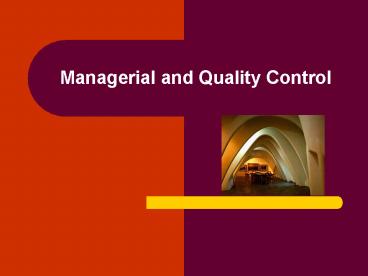Managerial and Quality Control PowerPoint PPT Presentation
Title: Managerial and Quality Control
1
Managerial and Quality Control
2
Total Quality Management - TQM
Based on decentralized control philosophy
- Organizationwide commitment to infusing quality
into every activity through continuous
improvement - Quality circles
- Benchmarking
- Six Sigma
- Reduced cycle time
- Continuous improvement
3
Quality Circle Process
Team Creates Quality Circle and
Collects Information
Team Selects Problems to Be Solved
Team Recommends Solutions
Team Gathers Data and Analyzes
Problems
Decision by Top Management
Feedback from Mangers to Quality Circles
4
TQM Success Factors
- TQM does not always work
- Six sigma principles might not be appropriate for
all organizational problems - Many contingencies can influence the success of
TQM program - Quality circles more beneficial when
challenging jobs - TQM more successful enriches jobs improves
motivation
5
Trends in Quality and Financial Control
- International Quality Standards ISO 9000
- New Financial Control Systems
- Economic value added - EVA
- Market value added - MVA
- Activity-based costing - ABC
6
Control Systems for Turbulent Times
- Open-Book Management sharing financial
information and results with all employees in the
organization - Balanced scorecard comprehensive management
control system that balances traditional
financial measures with measures of customer
service, internal business processes, and the
organizations capacity for learning and growth
Ethical Dilemma Is Internet Monitoring the
Way to Go?
7
The Balanced Scorecard
Financial
Do actions contribute to improving financial
performance?
Internal Business processes
Customers
Mission Goals
Do internal activities and processes add value
for customers and shareholders?
How well do we serve our customers?
Are we learning, changing, and improving?
Learning and Growth
PowerShow.com is a leading presentation sharing website. It has millions of presentations already uploaded and available with 1,000s more being uploaded by its users every day. Whatever your area of interest, here you’ll be able to find and view presentations you’ll love and possibly download. And, best of all, it is completely free and easy to use.
You might even have a presentation you’d like to share with others. If so, just upload it to PowerShow.com. We’ll convert it to an HTML5 slideshow that includes all the media types you’ve already added: audio, video, music, pictures, animations and transition effects. Then you can share it with your target audience as well as PowerShow.com’s millions of monthly visitors. And, again, it’s all free.
About the Developers
PowerShow.com is brought to you by CrystalGraphics, the award-winning developer and market-leading publisher of rich-media enhancement products for presentations. Our product offerings include millions of PowerPoint templates, diagrams, animated 3D characters and more.

